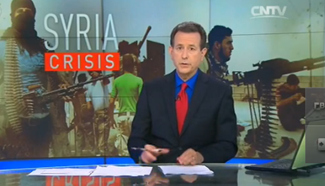BEIJING, Aug. 23 (Xinhua) -- Since the 2008 global financial crisis struck, policymakers in advanced economies have adopted various kinds of measures, ranging from fiscal, monetary to structural ones, to try to revive the economy, but to no avail.
The tools used to deal with the global financial crisis in its early stage, such as huge deficit and quantitative easing, proved to be insufficient in face of a sluggish global economic growth.
As a result, both the euro zone and Japan now have negative interest rates while waves of easing and huge "cheap money" failed to invigorate their economies.
As chief economist at ING Belgium Peter Vanden Houte recently put it, "the ECB's toolbox is getting emptier."
At the same time, the refugee crisis continues to drag down Europe, creating a profound influence on the European economy and society.
From the economic perspective, the refugees, most of whom are young people, are viewed as a complement to Europe's increasingly ageing labor market. However, integration problems have surfaced.
Europe is now divided on how to deal with the migrant crisis, which helped stimulate a rise of far-right political parties, fueled conservatism and populism across the continent and took a toll on the bloc's openness in trade and the economy.
The United States, the largest economy in the world, also has its own problems. The Economist, a highly regarded magazine, reported the split and polarization of the U.S. society.
The fact that Donald Trump has become a presidential candidate shows the anger and dismay of the people in the U.S. society, it said.
In Japan, Prime Minister Shinzo Abe presented the lofty stimulus plan and promised to use "three arrows" of monetary stimulus, fiscal stimulus and structural reform to boost economic growth. But the results showed clearly the "the three arrows" have largely failed or misfired.
The advanced economies are faced with a fast-aging society, a sluggish market demand and persistent debts, some economic experts said.
The difficult situation is the accumulated result of the debt crises in the long term, they said.
To put it another way, the debt crises of the advanced economies are far from over. But advanced economies are now trapped in a dilemma as to how to solve the problems: the market would lost confidence if the pace is too slow, while economic recovery would be damaged if it goes too fast.
In the crucial structural reforms, advanced economies struggle and advance slowly due to party strife, ambiguous reform aims, directions and steps as well as wavering policies.
With regard to the market, some main market bodies in the advanced economies are indifferent to the risks after the global financial crisis while financiers and enterprises are self-satisfied with a tendency to pursue short-term profits and take on too much risk, some experts said, warning of the danger of the outbreak of a new financial crisis.
Related:
BEIJING, Aug. 22 (Xinhua) -- Prospects for the global economy have been overshadowed by strong headwinds from advanced economies, as social inequality, the wealth gap and stagnant growth in them are becoming more and more prominent.
Such problems in major advanced economies like the United States and European nations have reflected the weakness of their economic policies, the limitation of their economic governance and the dilemma of their economic ideologies and theories. Full story










